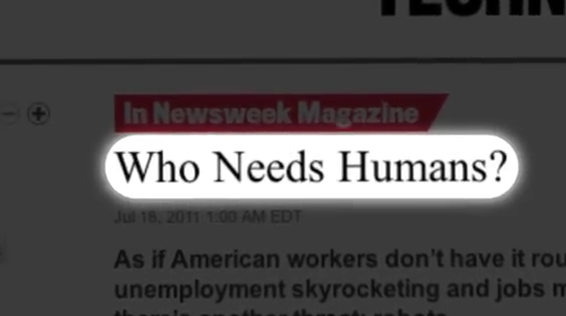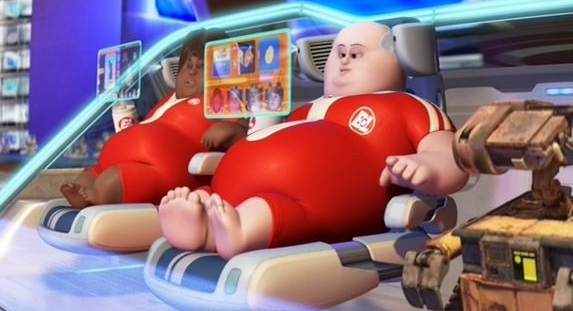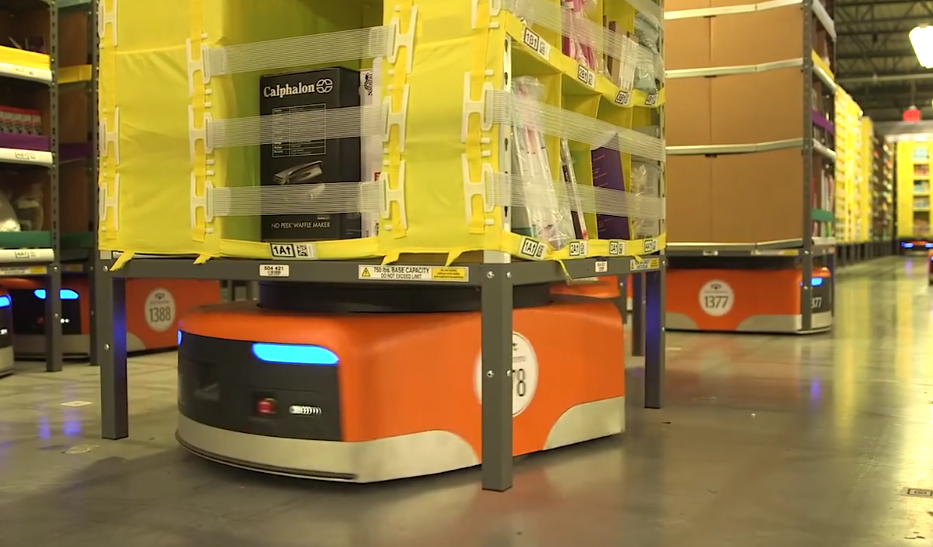Very good 9-minute film from PBS. Made in 2013. Link here.
Category Archives: Digital vs Human
Man Vs. Machine: Gandhi
Don’t know how I managed to miss the thoughts of Gandhi on man versus machine, but I did…
“The supreme consideration is man. The machine should not tend to make atrophied the limbs of man.”
“What I object to is the craze for machinery, not machinery as such. The craze is for what they call labour-saving money. Men go on ‘saving labour’ till thousands are without work and thrown on the open streets to die of starvation. I want to save time and labour, not for a fraction of mankind, but for all.”
“I can have no consideration for machinery which is meant either to enrich the few at the expense of the many, of without cause to displace the useful labour of many.”
“My opposition to machinery is much misunderstood. I am not opposed to machinery as such. I am opposed to machinery which displaces labour and leaves it idle.”
“I want the concentration of wealth, not in the hands of a few, but in the hands of all. Today machinery merely helps a few to ride on the backs of millions. The impetus behind it all is not the philanthropy to save labour, but greed. It is against this constitution of things that I am fighting with all my might….”
“Ours has been described as the machine age because the machine dominates our economy. ‘Now, what is machine?’ one may ask. In a sense, man is the most wonderful machine in creation. It can neither be duplicated nor copied. I have, however, used the word not in its wider sense, but in the sense of an appliance that tends to displace human or animal labour instead of supplementing it or merely increasing its efficiency. This is the first differential characteristic of the machine. The second characteristic is that there is no limit to its growth or evolution. This cannot be said of human labour. There is a limit beyond which its capacity or mechanical efficiency cannot go. Out of this circumstance arises the characteristic of the machine.”
Wine lists on paper vs. screens
Should wine lists only be allowed to exist on paper?
This is priceless. I was at dinner in London last night and asked for the wine list. The list promptly appeared – on an iPad. Great idea in theory, especially with longer lists, but we got locked out of the wine list twice because we forgot the password! (we’d been drinking).
So the question is should a list of wines, which to me are all about geography, provenance and age-old artisan skills, be allowed to exist digitally or float around in the cloud? My personal answer is fine to digital, just as long as I can still have the option of paper.
The Shock of the Now
A couple of things I noticed while reading some potential material for the next issue of What’s Next. The first is a review of the Book of Numbers by Joshua Cohen. The book starts off with a not so gentle suggestion that readers forget about lightly skimming the book on a Kindle or other such sterile screen: “If you’re reading this in a screen, fuck off.”
The second is a passage from a book called Reasons to Stay Alive by Matt Haig. He asked whether we’ve “been through some trauma we didn’t know about? Was the noise and speed of modern life the trauma for our caveman brains?” Or is it that “life was a kind of war that most people didn’t see?”
This chimes with a passage from my own book Digital Vs. Human:
“So have we invented any new fears of late? Is it the warp speed of geopolitical change that’s unsettling us? Is technology creating a new form of digital disorder that’s disorientating, or is it something else?”
Quotes about Technology, Computers, AI, Robots and humans
Some quotes lifted from my forthcoming book Digital Vs. Human, including a great quote that didn’t quite make it.
Opening quotes
‘The real problem of humanity is the following: we have palaeolithic emotions; medieval institutions; and god-like technology. And it is terrifically dangerous, and it is now approaching a point of crisis overall’ – Edward O. Wilson
‘Anything that gets invented after you’re thirty is against the natural order of things and the beginning of the end of civilisation as we know it until it’s been around for about ten years when it gradually turns out to be alright really.’ – Douglas Adams
Chapter heading quotes
‘Everybody has a plan until they get punched in the face’ – Mike Tyson
‘Computers make it easier to do a lot of things, but most of the things they make it easier to do don’t need to be done’ – Andy Rooney
‘One of the best protections against disappointment is to have a lot going on’ – Alain de Botton
‘If you have something that you don’t want anyone to know, maybe you shouldn’t be doing it in the first place’ – Eric Schmidt
‘The idea of the future being different from the present is so repugnant to our conventional modes of thought and behaviour that we, most of us, offer a great resistance to acting on it in practice’ – John Maynard Keynes
‘What if the cost of machines that think is people who don’t?’ – George Dyson
‘Logic will get you from A to B. Imagination will take you everywhere’ – Attributed to Albert Einstein
‘What’s wrong with education cannot be fixed with Technology’ – Steve Jobs
‘The lucky few who can be involved in creative work of any sort will be the true elite of mankind, for they alone will do more than serve a machine’ – Isaac Asimov
‘Technology is everything that doesn’t work yet’ – W. Daniel Hillis
‘Heralds don’t sing about men who lived in orthodoxy or played it safe, they sing about men who lived an uncertain future and took enough risks to make your head spin’ – Evan Meekins
‘It took humans four million years to evolve the hand axe, another two million years to somewhat improve it. And then, within a mere 20,000 years, a geological blink of the eye, they created art, agriculture, the wheel, computers and spaceships’ – George Zarkadakis
Quotes from the main text
‘There’s ‘no upside to being socialised by a robot’ – Sherry Turkle
(The internet is) ‘amazing in the same way a dishwasher is amazing’ – Evgeny Morozov
‘The error that evangelists make is to assume that the internet’s open, decentralised technology naturally translates into a less hierarchical or unequal society’ – Andrew Keen
‘I think all tech people are slightly autistic.’ Douglas Coupland
(The internet is shaping behaviour in) ‘what is broadly a more autistic direction’ – Tyler Cowen
‘Personal identity is increasingly defined by the approbation of a virtual audience.’ Susan Greenfield
‘Social networks erode previous social structures and reintroduce tribalism into our post-industrial societies’ – George Zarkadakis
‘What should the role of “extra” humans be if not everyone is still strictly needed?’ – Jaron Lanier
(Virtual reality) ‘is a way to escape the world into something more fantastic’ – Palmer Luckey
(Computer games) ‘provide an escape from purposelessness’. – Olivia Metcalf
(Young people are) ‘the miners’ canaries of society, acutely vulnerable to the peculiar hazards of our times’. – Richard Eckersley
‘Ours may be a time of material comfort and technological wonder, but it’s also a time of aimlessness and gloom.’ – Nicholas Carr
‘There is almost an injunction on today’s youth to lead fascinating lives. But if we fail, and most of us are doomed to, we’ll be considered losers.’ – Astrid Berges-Frisbey
(The internet) ‘encourages and even promotes insanity’- Larry Rosen
(Facebook and sites like it create) ‘ephemeral connections between imaginary identities’ – Susan Greenfield
‘It is in dialogue with pain that many beautiful things acquire their value’, and ‘People only get really interesting when they start to rattle the bars of their cages.’ – Alain de Botton
‘Social media ‘is an architecture of human isolation’ – Andrew Keen
‘The internet itself is in an incredibly elitist concentrator of wealth in the hands of the few while giving the appearance of voice and the appearance of democracy to people who are in fact being exploited by the technologies.’ – Jonathan Franzen
‘We’re already halfway towards a world where algorithms run nearly everything. As their power intensifies, wealth will concentrate towards them.’ – Christopher Steiner
‘The best minds of my generation are thinking about how to make people click ads.’ – Jeff Hammerbacher
‘Real stupidity beats artificial intelligence every time.’ – Terry Prachett
‘The greatest heist in history wasn’t about taking money; it was about taking your information — and you agreed to all of it.’ – Terms and Conditions May Apply
‘At some point, automation reaches a critical mass. It begins to shape societies norms, assumptions, and ethics.’ – Nicholas Carr
‘The logic leading to fully autonomous systems seems inescapable’. Thomas Adams
‘A pilotless airliner is going to come. It’s just a question of when.’ – James Albaugh
‘I still believe that sitting down and reading a book is the best way to really learn something.’ – Eric Schmidt
‘Teaching is a human experience. Technology is a distraction when we need literacy, numeracy, and critical thinking.’ – Paul Thomas
(We) ‘are shifting from manufacturing massively replicated products … to producing personalised products and services distributed directly to customers’ – George Zarkadakis
‘It’s quite possible there are unique things about humans. But, in terms of intelligence, it doesn’t seem likely’ – Demis Hassabis
‘Bit by bit, our cells and tissues are becoming just another brand of hardware to be upgraded.’ John Rogers
‘Where technology pushes too far, society pushes back.’ – Bob Seidensticker
‘You have to have an idea of what you are going to do, but it should be a vague idea.’ – Picasso
‘By far the best way I know to engage the religious sensibility, the sense of awe, is to look up on a clear night.’ – Carl Sagan
(We are developing) ‘amnesia about everything except the immediate, the instant, the now’ – Andrew Keen
(By 2014) ‘Much effort will be put into the designing of vehicles with “Robot-brains” … Communications will become sight-sound … Mankind will therefore have become largely a race of machine tenders.’ – Isaac Asimov
I have seen the future, and it’s still in the future’ – .Jack Rosenthal
Unused quotes
‘Something funny I have noticed, perhaps you have noticed it, too. You know what futurists and online-ists and cut-out-the-middle-man-ists and Davos-ists and deconstructionists of every stripe want for themselves? They want exactly what they tell you you no longer need, you pathetic, overweight, disembodied Kindle reader. They want white linen tablecloths on trestle tables in the middle of vineyards on soft blowy afternoons … they want a nineteenth century bookshop … they want five-star bricks and mortar and DO NOT DISTURB signs and views of the park’. – Richard Rodriguez
An emerging inactivity crisis (with no real friends)
Spoiled for choice today. First, a study by Oxford University suggests that the average Facebook user has 155 friends (close to the ‘Dunbar number’ of 150, which anthropologists suggest is the maximum number of friends that humans can maintain relationships with). However, the study also says that the average user has mere 4 friends that are any use. ‘Any use’ is my phrase, but the study found that only 4 friends can be relied on to help in a real crisis.
Meanwhile, a study conducted on behalf of the British Heart Foundation says that 9 out of 10 ‘iPad toddlers’ are not physically active enough to be healthy. 84% of pre-school children in the UK do not even manage 1 hour of exercise per day. As Steven Ward, of UK Active comments: ‘The fact is that the current generation is hunched over screens from an early age and the iPhone has become the dummy of today’s society”.
Obviously I’m writing this hunched over a screen and tethered to an iPhone….
In a crisis would you be prepared to deal with a smart machine over another human being?
Over Christmas I unfortunately had to call the emergency services at a friend’s house. Suffice to say that I was somewhat anxious. The operator on the end of the telephone was wonderful. She had one of those slow silky voices that was not only calming, but which somehow demanded complete obedience.
So here’s the thing. A week or so later my mind started wandering off as it does and I began to wonder whether one day the emergency services might be tempted to replace human call centre operatives with synthetic voices (in other words fully automated digital systems). It wouldn’t be that difficult to do and the cost savings would be significant. In a moment of sci-fi imagining I even wondered whether it might be possible to select celebrity voices to converse with, much in the same way that you can select celebrity voices to add to your in-car GPS navigation system.
Weirder things have happened…
How LED Lights Stole Christmas
Rather bizarrely, one of the most popular blog posts I’ve ever written concerned colour. Specifically, why grey is the new black. Given that I’ve obviously acquired a readership amongst colour consultants, decorators, architects and members of the Pinterest community, I’ve got something related to say and it’s something that hasn’t been commented on elsewhere. At least this was true until Christmas when Tyler Brule, writing in the Financial Times Weekend magazine, made the following astute comment:
“For the past two weeks I’ve been in South Tyrol hosting family, stocking up on wines from local producers and watching my mother hand-paint 1,500 LED Christmas lights in order to create the right seasonal effect indoors and out. (“Do people not see how bright and ugly LED lights are and that they’ve completely changed the spirit of Christmas?” she told me. “These are the lights they should be banning!”)”
His mother is right. LED lights have ruined Christmas and much else beside. The problem, I think, is that LED lights are too bright. There is no subtlety to LED lighting and, one might add, no soul. ‘White’ LEDs are the biggest problem though, because they aren’t really white at all. They give off a slight green hue, which makes me think of refrigerated meat well past its use by date. I’m told this problem is being addressed, but until it is it’s perhaps it’s time to get out the candles.
Staying human in an age of automation
I thought this, via Aeon, would be interesting, although when I watched the video (7 minutes here) I wasn’t so sure. Is he saying that we need to ‘gamify’ all aspects of work so that people are more engaged and have more fun? Why does work have to be fun all he time and surely some aspects of work need a level of deep thinking and attention that screens, constant movement and distraction destroy. Moreover, shouldn’t humans focus on what humans do best and use machines to amplify this?
Personally I think that some aspects of gaming could be useful to apply to real world situations, including work in some instances, but overall I think the negatives far outweigh the positives and that the argument is weak. Surely, this is yet another example of digital solutionism. Screens and games are fine, but they shouldn’t remove us, distract us or distance us from physical human contact or thinking that is deep, sustained and reflective.
This is worth a read too if you are pro, although again I don’t agree with it.
Digital Vs Human – show me the money (final)
Given what’s going on in China I thought I’d share the edited version of the chapter on the economy while there’s a vague chance of me being prophetic. For those readers that are new to this I had huge problems with this chapter and it underwent several re-writes.
The older versions were posted here and here and here and here. (Runs from newer to older versions).
Final version is here (23 pages, PDF)






